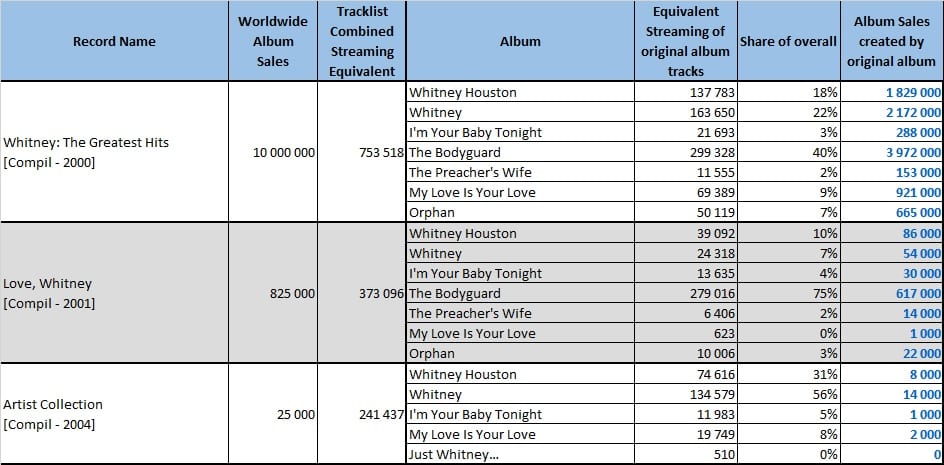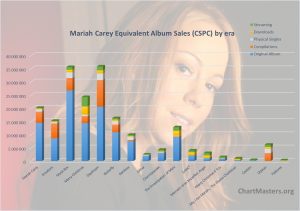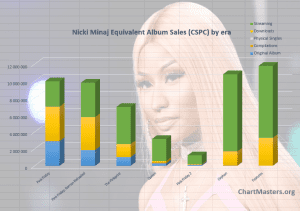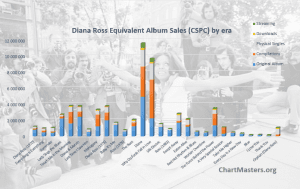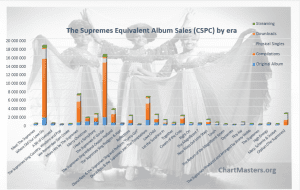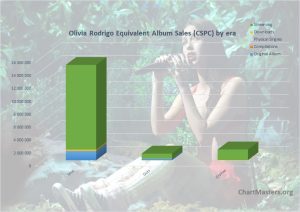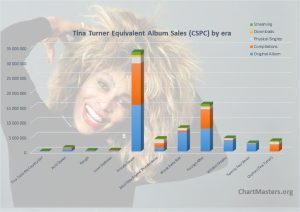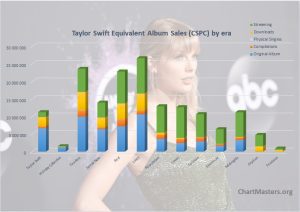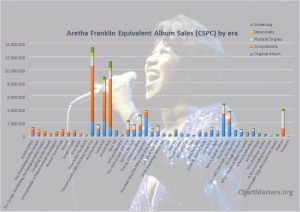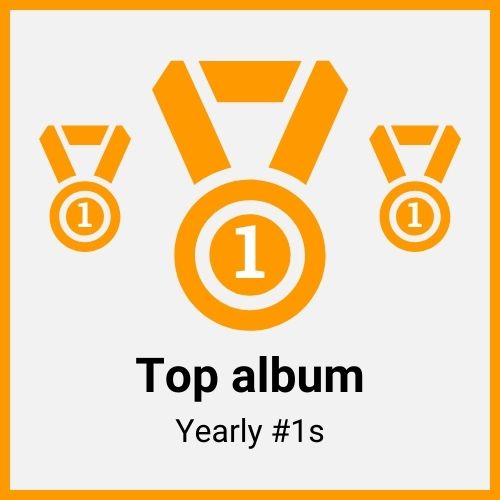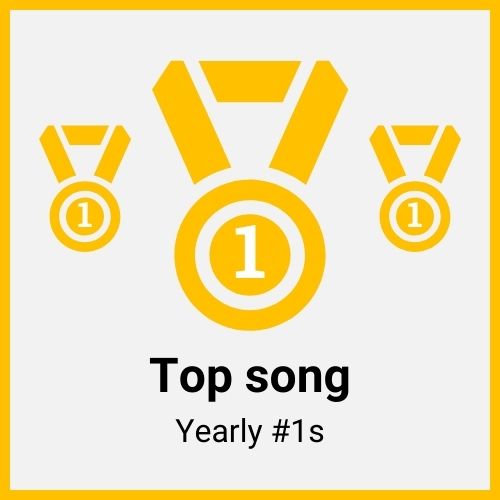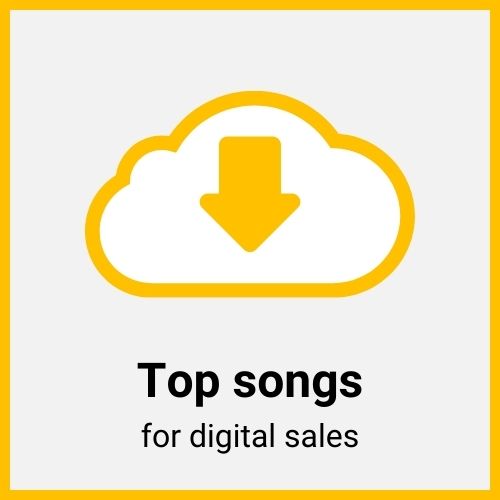Whitney Houston albums and songs sales
UPDATE: Please note all figures have been updated as of May 4, 2017.
On February 11, 2012, the death of legendary diva Whitney Houston saddened millions of people. The woman that used to be recognized for her pure voice and image faced bad times until her ultimate passing.
Memories of her stand-out performances and songs were still very much alive in the minds of many, yet her catalog still received, quite naturally, a sizable boost after her untimely passing.
How much is her catalog worth though? Everybody remembers the iconic The Bodyguard. Everything is iconic about it – the movie, the album, the single, and, of course, its main actress and singer, Whitney Houston. Such a juggernaut would shadow the remaining albums of most acts. So how do other studio albums from her stand in comparison?
Starting way back in 1985 with an eponymous album, she then returned with Whitney in 1987 and kept recording until her last effort, the 2009 release I Look To You. If her career had ups, it definitely had downs too.
ChartMasters’ method: the CSPC
As usual, I’ll be using the Commensurate Sales to Popularity Concept (CSPC) in order to relevantly gauge the act’s results. It will not only bring you sales information for all albums, physical and download singles, as well as audio and video streaming. In fact, it will really determine the act’s popularity.
If you are not yet familiar with the CSPC method, below is a nice and short video of explaining the concept. I recommend watching it before reading on and to the sales figures. You’ll get the idea in just two minutes.
And if you want to know the full method as well as formulas, you can read the full introduction article.
Now let’s get into the artist’s detailed sales figures!
Original Albums Sales
Whitney Houston (1985)
- America
- US – 13,600,000
- Canada – 1,500,000
- Argentina – N/A
- Brazil – N/A
- Mexico – N/A
- Asia – 1,705,000
- Japan – 1,000,000
- Oceania
- Australia – 375,000
- New Zealand – 60,000
- Europe – 4,250,000
- UK – 1,450,000
- France – 210,000
- Germany – 850,000
- Italy – 350,000
- Spain – 100,000
- Sweden – 230,000
- Netherland – 165,000
- Switzerland – 100,000
- Austria – 65,000
- Finland – 30,000
- World – 21,900,000
Whitney (1987)

- America
- US – 9,800,000
- Canada – 1,100,000
- Argentina – N/A
- Brazil – N/A
- Mexico – N/A
- Asia – 1,570,000
- Japan – 700,000
- Oceania
- Australia – 300,000
- New Zealand – 50,000
- Europe – 6,360,000
- UK – 2,400,000
- France – 360,000
- Germany – 925,000
- Italy – 600,000
- Spain – 250,000
- Sweden – 250,000
- Netherland – 250,000
- Switzerland – 140,000
- Austria – 120,000
- Finland – 60,000
- World – 19,800,000
I’m Your Baby Tonight (1990)
- America
- US – 4,700,000
- Canada – 300,000
- Argentina – N/A
- Brazil – N/A
- Mexico – N/A
- Asia – 915,000
- Japan – 475,000
- Oceania
- Australia – 120,000
- New Zealand – 20,000
- Europe – 3,510,000
- UK – 800,000
- France – 440,000
- Germany – 620,000
- Italy – 225,000
- Spain – 250,000
- Sweden – 140,000
- Netherland – 155,000
- Switzerland – 110,000
- Austria – 80,000
- Finland – 36,000
- World – 9,900,000
The Bodyguard (1992)
:format(jpeg):mode_rgb():quality(40)/discogs-images/R-6019200-1408980290-9064.jpeg.jpg)
- America
- US – 17,750,000
- Canada – 1,800,000
- Argentina – 350,000
- Brazil – 825,000
- Mexico – 650,000
- Asia – 6,320,000
- Japan – 2,950,000
- South Korea – 1,300,000
- Taiwan – 500,000
- Indonesia – 400,000
- Singapore – 120,000
- Oceania
- Australia – 525,000
- New Zealand – 90,000
- Europe – 12,160,000
- UK – 2,575,000
- France – 1,725,000
- Germany – 1,850,000
- Italy – 1,250,000
- Spain – 800,000
- Sweden – 460,000
- Netherland – 600,000
- Switzerland – 310,000
- Austria – 220,000
- Finland – 57,000
- World – 41,100,000
The Preacher’s Wife (1996)
- America
- US – 3,400,000
- Canada – 180,000
- Argentina – N/A
- Brazil – N/A
- Mexico – N/A
- Asia – 475,000
- Japan – 225,000
- Oceania
- Australia – 55,000
- New Zealand – N/A
- Europe – 1,020,000
- UK – 100,000
- France – 70,000
- Germany – 300,000
- Italy – 110,000
- Spain – 70,000
- Sweden – 50,000
- Netherland – 30,000
- Switzerland – 40,000
- Austria – 20,000
- Finland – N/A
- World – 5,300,000
My Love Is Your Love (1998)

- America
- US – 4,550,000
- Canada – 325,000
- Argentina – N/A
- Brazil – N/A
- Mexico – N/A
- Asia – 800,000
- Japan – 400,000
- Oceania
- Australia – 60,000
- New Zealand – 25,000
- Europe – 4,270,000
- UK – 975,000
- France – 695,000
- Germany – 800,000
- Italy – 200,000
- Spain – 150,000
- Sweden – 180,000
- Netherland – 165,000
- Switzerland – 180,000
- Austria – 100,000
- Finland – 25,000
- World – 10,400,000
Just Whitney… (2002)
- America
- US – 1,100,000
- Canada – 40,000
- Argentina – N/A
- Brazil – 100,000
- Mexico – N/A
- Asia – 230,000
- Japan – 100,000
- Oceania
- Australia – N/A
- New Zealand – N/A
- Europe – 360,000
- UK – 50,000
- France – 60,000
- Germany – 60,000
- Italy – 55,000
- Spain – N/A
- Sweden – N/A
- Netherland – 5,000
- Switzerland – 40,000
- Austria – 5,000
- Finland – N/A
- World – 1,900,000
OneWish: The Holiday Album (2003)

- America
- US – 650,000
- Canada – 25,000
- Argentina – N/A
- Brazil – 20,000
- Mexico – N/A
- Asia – 45,000
- Japan – 25,000
- Oceania
- Australia – N/A
- New Zealand – N/A
- Europe – N/A
- UK – N/A
- France – 5,000
- Germany – N/A
- Italy – N/A
- Spain – N/A
- Sweden – N/A
- Netherland – N/A
- Switzerland – N/A
- Austria – N/A
- Finland – N/A
- World – 900,000
I Look to You (2009)
- America
- US – 1,250,000
- Canada – 140,000
- Argentina – N/A
- Brazil – 70,000
- Mexico – 5,000
- Asia – 120,000
- Japan – 70,000
- Oceania
- Australia – 20,000
- New Zealand – 5,000
- Europe – 720,000
- UK – 280,000
- France – 60,000
- Germany – 120,000
- Italy – 50,000
- Spain – 15,000
- Sweden – 25,000
- Netherland – 20,000
- Switzerland – 20,000
- Austria – 15,000
- Finland – N/A
- World – 2,400,000
Original Album Sales – Comments
1985 Whitney Houston – 21,900,000
1987 Whitney – 19,800,000
1990 I’m Your Baby Tonight – 9,900,000
1992 The Bodyguard – 41,100,000
1996 The Preacher’s Wife – 5,300,000
1998 My Love Is Your Love – 10,400,000
2002 Just Whitney… – 1,900,000
2003 One Wish: The Holiday Album – 900,000
2009 I Look to You – 2,400,000
It is difficult to define a pattern or even an average for Whitney Houston’s album sales considering how diverse their fortunes have been. Out of the 9 records listed above, two are soundtracks featuring songs by other artists – more on next page about this – and one is a Christmas album. Plus, her latter albums sold fairly low amounts in comparison to her earlier sets.
Nevertheless, a total of 113,6 million over 9 album represents a pretty healthy average of 12,6 million per album. Obviously owning a 41-million seller helps. The Bodyguard confirms its status of gigantic smash by being quite simply the highest selling album studied so far, eclipsing the previous mark of 38,1 million registered by another classic soundtrack, Grease. Its lead is rather impressive with a 3 million gap, plus a 10 million gap over the 5th biggest album met up to now – list below:
1 1978 Soundtrack – Grease – 38,100,000
2 1971 Led Zeppelin – Led Zeppelin IV – 36,800,000
3 1977 Fleetwood Mac – Rumours – 35,500,000
4 1997 Shania Twain – Come On Over – 33,500,000
5 1987 Guns N’ Roses – Appetite For Destruction – 30,900,000
As with every monster success, it makes flops look even bigger. Shifting 108,4 million across her first sex 80s-90s albums, Whitney Houston took a massive hit with 2002 album Just Whitney, an album that has yet to reach 2 million units and arguably one of the biggest bombs of all-time for the music industry. While I Look to You had started to turn things to a more positive side after a terrible decade, the final whisper of the singer prevented us from getting additional chapters.
To Count or not to Count
Estimating album sales always brings a lot of debates. I’m well aware that Whitney Houston fans won’t be happy with Whitney being under 20 million and I’m Your Baby Tonight under 10 million, although that’s what facts dictate. Even more than estimates judged too conservative or too optimistic, a subject that ends up with heavy contestations day in day out is the credits of soundtracks issue. As Whitney Houston is massively impacted by such decisions since she participated in three high selling Soundtracks – The Bodyguard, The Preacher’s Wife and Waiting to Exhale, the latter being excluded from her tally in this study – it is important to answer this soundtracks credit question.
The Bodyguard, Titanic, Saturday Night Fever, The Lion King are all massively successful albums. Naturally, fans of artists who contributed to their achievements want them to be reattributed with their sales. The main argument to claim the rights of an album’s sales is often the number of songs on it or their success. Those points can be understood but aren’t really valid though.
Madonna performed only 4 songs out of 9 on Who’s That Girl, just like Whitney Houston is responsible of only 6 songs out of 13 on Bodyguard. Yet, both albums feature among those artists discographies. Then, Phil Collins is part of 8 songs out of 13 from Brother Bear, yet it isn’t considered as one of his albums.
In the same way, success doesn’t tell the real story. All Mariah Carey songs from Glitter kind of flopped, undoubtedly Rihanna brought more sales in for Eminem‘s Recovery thanks to the Love The Way You Lie smash single than Mariah Carey singles to the Soundtrack. Still, Glitter is a Mariah Carey album while Recovery is clearly not a Rihanna record.
The only question that one should consider is – who is the owner of the album? The Bodyguard is a Whitney Houston project. James Horner is the owner of Titanic. Disney is the owner of Brother Bear. How do we define that? Well, actually it is quite easy as covers make it very clear.
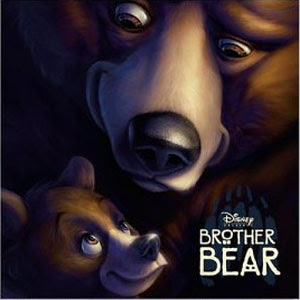
.jpg)

As you can see, all those albums are tagged as Original Soundtrack Album. The one of Titanic highlights that all songs are conducted by James Horner, with no mention to Celine Dion, which indicates that she featured on the album but wasn’t responsible for it. The image is important too as all those soundtracks present a picture extracted from the movie rather than axing it around a recording artist.
On the other side, the following soundtracks explicitly focus on one artist:
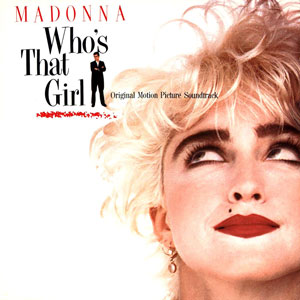


Not only the visual is artist-axed, but it also includes clearly the name of the singer. All those albums were promoted as albums from the related artist, rather than as a soundtrack.
As a trademark of that treatment, all those albums were released within’ the sequence of the artist’s discography. They perfectly fit between other eras from them. On the other side, Titanic was released and promoted at the same time as Let’s Talk About Love from Celine Dion, which shows it doesn’t belong to her discography.
Applying this logic to Whitney Houston forces us to include The Bodyguard and The Preacher’s Wife while excluding Waiting To Exhale.
Whitney Houston’s physical singles sales
Record breaking album sales of Whitney Houston have been highly commented on for very long, the same can’t be said about her singles though. For good reasons? No. The singer has been an incredible singles seller too.
1985-90
The singles from her first three studio albums combine for 18,6 million units sold. At nearly 3 million, I Wanna Dance with Somebody (Who Loves Me) is unsurprisingly the highest seller.
Whitney Houston (1985) – 2,148,000 equivalent albums
You Give Good Love – 940,000
Saving All My Love for You – 2,600,000
How Will I Know – 1,650,000
All at Once – 190,000
Greatest Love of All – 1,420,000
Hold Me – 360,000
Whitney (1987) – 2,274,000 equivalent albums
I Wanna Dance with Somebody (Who Loves Me) – 2,920,000
Love Will Save the Day – 820,000
Didn’t We Almost Have It All – 1,290,000
So Emotional – 1,500,000
Where Do Broken Hearts Go – 1,030,000
I Know Him So Well – 20,000
I’m Your Baby Tonight (1990) – 1,152,000 equivalent albums
I’m Your Baby Tonight – 1,740,000
My Name Is Not Susan – 310,000
All the Man That I Need – 1,310,000
Miracle – 460,000
I Belong to You – 20,000
1992-98
Selling high amounts of albums and singles with the same material is a tough target… which The Bodyguard managed perfectly.
The lead single I Will Always Love You sold an absurd total of 10,56 million physical units, making it the highest selling single studied so far and replicating the album achievement, an unreal result. Just like in the album front, it tops none other than the Grease Soundtrack lead single, You’re the One That I Want.
The Top 10 prior to this article is displayed below:
1 1978 Soundtrack – You’re the One That I Want [Grease] – 10,400,000
2 1997 Céline Dion – My Heart Will Go On [Let’s Talk About Love] – 8,100,000
3 1984 George Michael – Careless Whisper [Make It Big] – 6,500,000
4 1975 Queen – Bohemian Rhapsody [A Night At The Opera] – 6,400,000
5 1999 Britney Spears – …Baby One More Time […Baby One More Time] – 6,000,000
1 1992 – Soundtrack / Whitney Houston – I Will Always Love You [The Bodyguard] – 10,560,000
2 1978 – Soundtrack – You’re the One That I Want [Grease] – 10,400,000
3 1968 – Beatles – Hey Jude [Orphan] – 8,200,000
4 1997 – Soundtrack / Celine Dion – My Heart Will Go On [Let’s Talk About Love] – 8,100,000
5 1963 – Beatles – I Want to Hold Your Hand [Orphan] – 7,800,000
6 1977 – Soundtrack / Bee Gees – Stayin’ Alive [Saturday Night Fever] – 6,470,000
7 1975 – Queen – Bohemian Rhapsody [A Night At The Opera] – 6,400,000
8 1984 – George Michael – Careless Whisper [Make It Big] – 6,290,000
9 1999 – Britney Spears – …Baby One More Time […Baby One More Time] – 6,000,000
10 1979 – Bee Gees – Too Much Heaven [Spirits Having Flown] – 5,640,000
Whitney Houston sold way more singles during the 90s than just this one with at least 2 songs from each era topping the million mark. With 7,44 million units sold combined, My Love Is Your Love hits performed incredibly well.
The Bodyguard (1992) – 4,074,000 equivalent albums
I Will Always Love You – 10,560,000
I Have Nothing – 1,150,000
I’m Every Woman – 1,440,000
Run to You – 290,000
Queen of the Night – 140,000
NB: Song It’s Gonna Be a Lovely Day which isn’t from Whitney Houston sold 300,000 units, adding 90,000 units to the album as we will see in final totals.
The Preacher’s Wife (1996) – 741,000 equivalent albums
I Believe in You and Me – 1,110,000
Step by Step – 1,280,000
My Heart Is Calling – 80,000
My Love Is Your Love (1998) – 2,232,000 equivalent albums
It’s Not Right, But It’s Okay – 1,450,000
Heartbreak Hotel – 1,600,000
My Love Is Your Love – 2,640,000
When You Believe – 1,320,000
If I Told You That – 130,000
I Learned from the Best – 300,000
2002-09 and orphan songs
Reaching the latter part of her career, the following singles are much weaker sellers. Just Whitney flopped hard due to the awful performances of its singles while the market of physical singles collapsed shortly after.
There are still several notable sellers within’ the Orphan category. The biggest of them is the 2-million seller Exhale (Shoop Shoop). In fact, if the Soundtrack isn’t credited to her, the single obviously is.
All together, Whitney sold 49,2 million physical singles.
Just Whitney… (2002) – 87,000 equivalent albums
One of Those Days – 110,000
Try It on My Own – 50,000
Whatchulookinat – 130,000
One Wish: The Holiday Album (2003) – 8,000 equivalent albums
One Wish (For Christmas) – 25,000
I Look to You (2009) – 23,000 equivalent albums
Million Dollar Bill – 25,000
I Look to You – 50,000
Orphan – 2,118,000 equivalent albums
One Moment in Time – 1,820,000
The Star Spangled Banner – 1,120,000
Exhale (Shoop Shoop) – 1,750,000
Count On Me – 950,000
Why Does It Hurt So Bad – 280,000
Could I Have This Kiss Forever – 740,000
Same Script, Different Cast – 60,000
It Isn’t, It Wasn’t, It Ain’t Never Gonna Be – 180,000
Something in Common – 60,000
Remaining Singles – 100,000
Whitney Houston’s digital singles sales
Let’s be honest, Whitney Houston was an awful seller within the digital format up to her death. After the tragic event in 2012, she got a tremendous boost, selling millions within a few days. Her golden era tracks listed below were among the first choices for consumers, combining for more than 12 million sales.
Very logically, the highest selling download track of Whitney Houston is I Will Always Love You from The Bodyguard, which is up to a huge 5,7 million worldwide. I Have Nothing is a strong second from the same album. Just like in the physical part, hits from My Love Is Your Love broke no records individually but add for a very decent total together. Hits from those 90s albums sold nearly 15 million.
And once again, when coming to Just Whitney, there is no party anymore. Only I Look To You did ok-ish in download sales from this list.
The last songs from 2002 onwards push the diva’s total of download singles sales to 34 million.
Whitney Houston (1985) – 885,000 equivalent albums
You Give Good Love – 600,000
Saving All My Love for You – 1,250,000
How Will I Know – 1,350,000
All at Once – 600,000
Greatest Love of All – 1,700,000
Remaining tracks – 400,000
Whitney (1987) – 765,000 equivalent albums
I Wanna Dance with Somebody (Who Loves Me) – 2,600,000
Didn’t We Almost Have It All – 800,000
So Emotional – 400,000
Where Do Broken Hearts Go – 700,000
Remaining tracks – 600,000
I’m Your Baby Tonight (1990) – 195,000 equivalent albums
I’m Your Baby Tonight – 450,000
All the Man That I Need – 650,000
Remaining tracks – 200,000
The Bodyguard (1992) – 1,538,000 equivalent albums
I Will Always Love You – 5,750,000
I Have Nothing – 1,900,000
I’m Every Woman – 750,000
Run to You – 1,250,000
Queen of the Night – 300,000
Remaining tracks – 300,000
NB: Remaining songs which are not from Whitney Houston add for 250,000 units, translated into 38,000 equivalent albums.
The Preacher’s Wife (1996) – 210,000 equivalent albums
I Believe in You and Me – 400,000
Step by Step – 400,000
Remaining tracks – 600,000
My Love Is Your Love (1998) – 480,000 equivalent albums
It’s Not Right, But It’s Okay – 700,000
Heartbreak Hotel – 400,000
My Love Is Your Love – 900,000
When You Believe – 700,000
Remaining tracks – 500,000
Just Whitney… (2002) – 75,000 equivalent albums
Remaining tracks – 500,000
One Wish: The Holiday Album (2003) – 120,000 equivalent albums
Remaining tracks – 800,000
I Look to You (2009) – 300,000 equivalent albums
Million Dollar Bill – 700,000
I Look to You – 600,000
Remaining tracks – 700,000
Orphan – 570,000 equivalent albums
One Moment in Time – 1,300,000
The Star Spangled Banner – 600,000
Exhale (Shoop Shoop) – 400,000
Do You Hear What I Hear? – 400,000
Remaining tracks – 1,100,000
Whitney Houston’s streaming sales
Streaming is made of two families – audio and video. Our CSPC methodology now includes both to better reflect the real popularity of each track. The main source of data for each avenue is respectively Spotify and YouTube. As detailed in the Fixing Log article, Spotify represents 132 million of the 212 million users of streaming platforms, while YouTube is pretty much the only video platform generating some revenue for the industry. Below is the equivalence set on aforementioned article:
Audio Stream – 1500 plays equal 1 album unit
Video Stream – 11,750 views equal 1 album unit
Thus… Equivalent Albums Sales = 212/132 * Spotify streams / 1500 + YouTube views / 11750
Streaming Part 1 – Pure Years
The passing of Whitney Houston happened before the streaming explosion, thus there isn’t that much artificial inflation on these numbers.
Her first two albums remain quite popular, both with solid hits. How Will I Know is over 50 million audio streams while Saving All My Love For You and Greatest Love Of All combine for 50 million too. Those same singles, including the last one, perform well on YouTube too. All told, the Whitney Houston LP gets 144,000 equivalent album sales from the streaming of its songs.
Whitney records an even bigger 170,000 units, largely thanks to the huge smash I Wanna Dance With Somebody which is on 114 million audio streams and 116 million video streams.
The lack of love given to tracks from I’m Your Baby Tonight is confirmed with its pretty poor overall results. No song from it hits 10 million even if the video of All The Man That I Need does well.
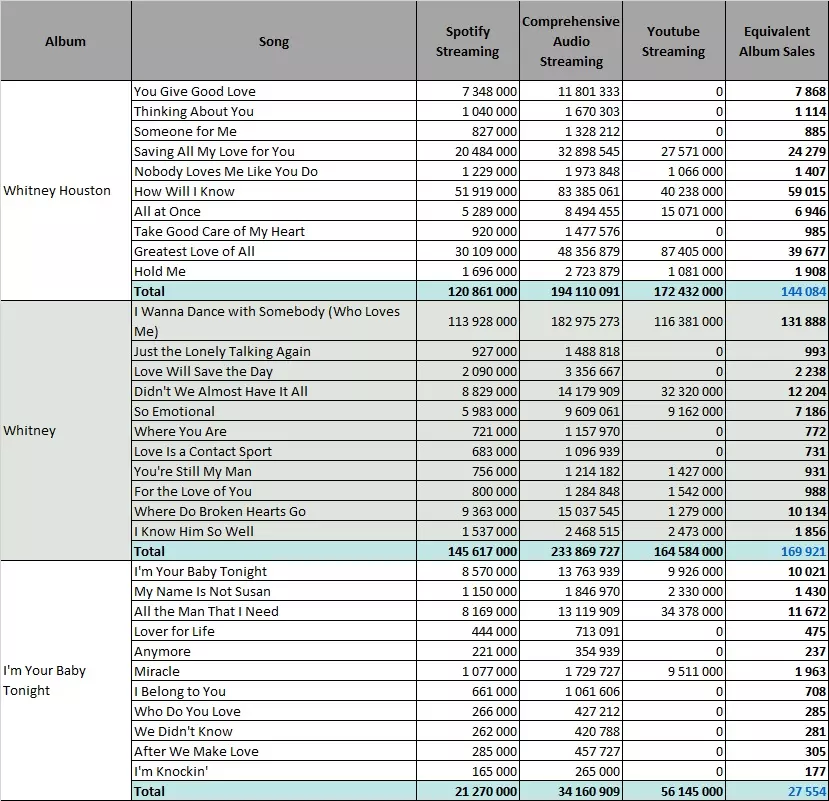
Streaming Part 2 – Soundtracks all over the place
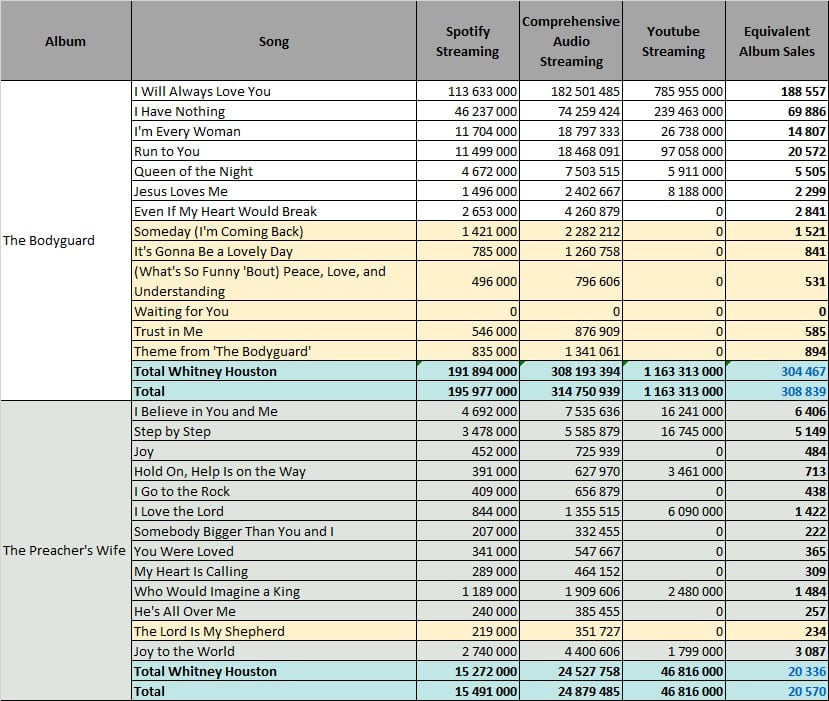
Streaming Part 3 – Love then Nothing
As previously mentioned, these soundtracks feature songs that are not from Whitney Houston. While the credit of these albums goes to her, the credit of individual songs sang by someone else don’t, which explains why there are two totals. The first will be awarded to the artist CSPC total, the second to the album tally.
Maybe surprisingly, I Will Always Love You isn’t as dominant as in other formats when it comes to audio streams with the same result as I Wanna Dance With Somebody. Its YouTube views however are gigantic at 786 million. Whitney Houston is dominant among The Bodyguard soundtrack – even if she performs only 6 out of 13 tracks, they are responsible for near 99% of its streams. They translate into 309,000 album sales. The Preacher’s Wife is way weaker at 21,000 units only due to no song reaching even 5 million streams.
Formats change but the story remains the same. Just Whitney has atrocious results in streaming, bringing in a mere 8,000 equivalent album sales. This truly pales in comparison to the nice My Love Is Your Love results. With three songs from 15 to 28 million plays and 43-121 million views, it adds for 108,000 units.
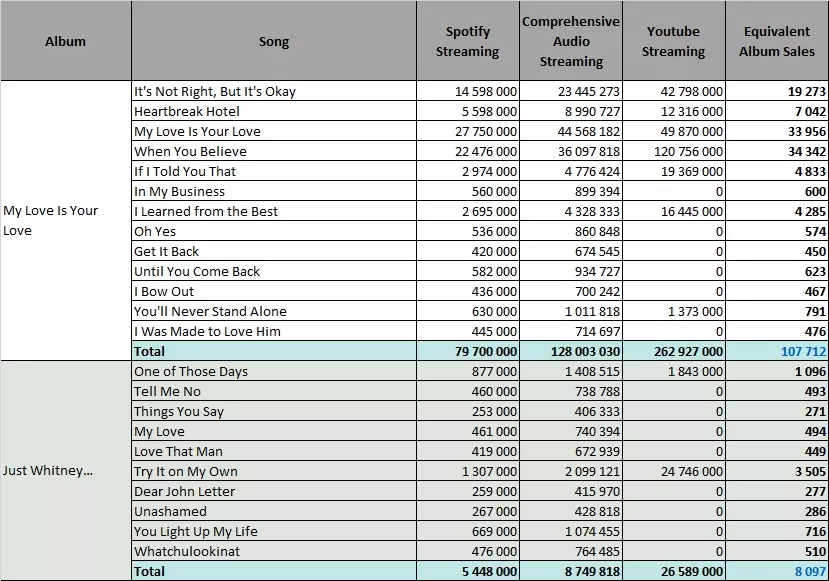
Streaming Part 4 – Latter years
As records which live for roughly 6 weeks per year, often aired only during a few days dinners, Christmas albums are perfect products to stream rather than to buy. This is how One Wish gets 16,000 equivalent units from streams in spite of very little appeal of the album upon release. I Look To You also does decently at 58,000 copies.
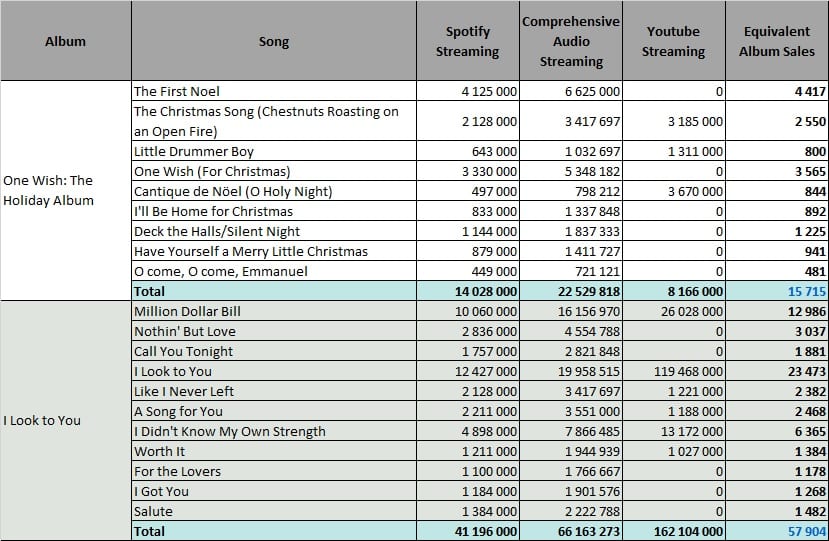
Streaming Part 5 – Orphan Songs
A whole bunch of songs from compilation exclusives to Waiting To Exhale hits. This section includes several good performers including the 10-million streams 1988 Olympics song One Moment In Time.
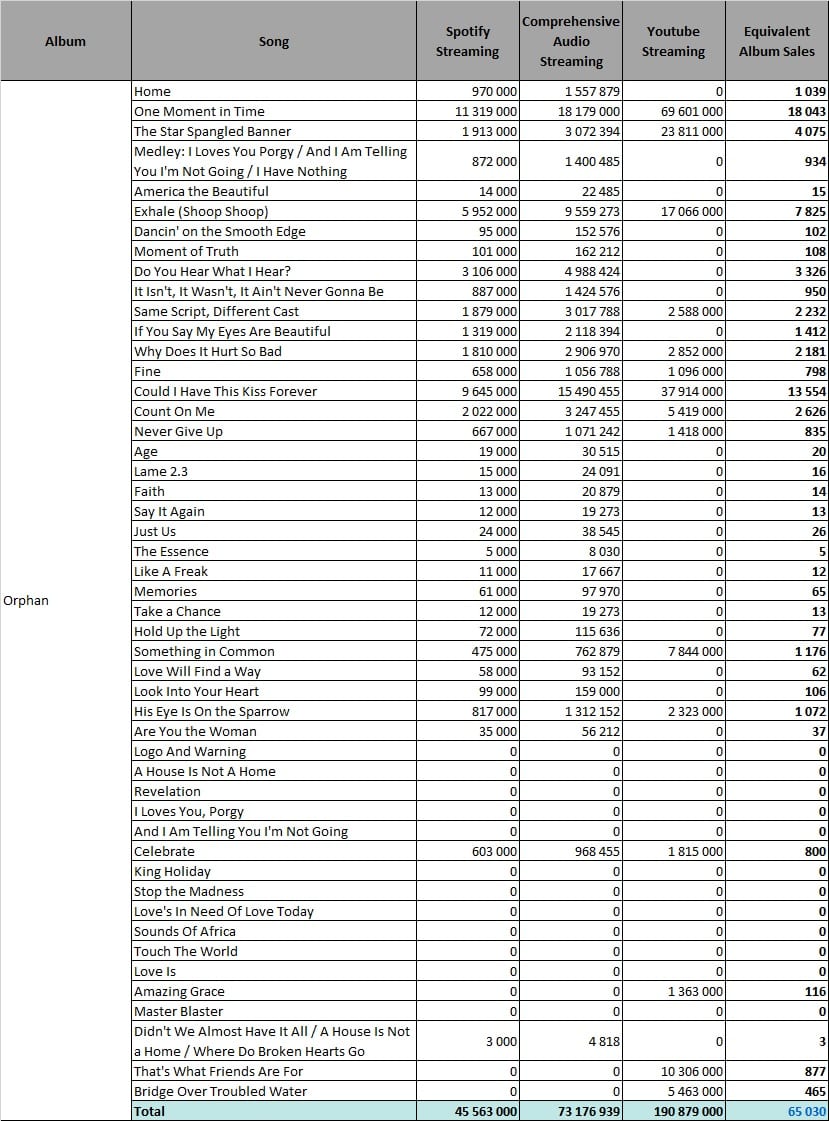
Full Length related records Sales
For 15 years the career of Whitney Houston had no compilation and no live album, with only a few music videos released. This changed completely in 2000. All those non-studio full length records are studied below.
Remaining Long Format Part 1 – Compilations #1
How to understand this table? If you check for example Whitney: The Greatest Hits compilation line, those figures mean it sold 10,000,000 units worldwide. The second statistics column means all versions of all songs included on this package add for 754,000 equivalent album sales from streams of all types.
The second part on the right of the table shows how many streams equivalent sales are coming from each original album plus the share it represents on the overall package. Thus, streaming figures tell us The Bodyguard songs are responsible for 40% of the Whitney: The Greatest Hits tracklist attractiveness, which means it generated 3,972,000 of its 10,000,000 album sales and so on for the other records.
As expected, Whitney Houston, Whitney and The Bodyguard are the main forces selling those compilations. As Love, Whitney is love-themed, it ignores up-tempo songs, explaining why the distribution pattern is different.
BONUS – Original Compilation Sales
Whitney: The Greatest Hits (2000)
- America
- US – 3,000,000
- Canada – 325,000
- Argentina – N/A
- Brazil – 135,000
- Mexico – N/A
- Asia – 1,350,000
- Japan – 750,000
- Oceania
- Australia – 180,000
- New Zealand – 40,000
- Europe – 4,510,000
- UK – 1,775,000
- France – 610,000
- Germany – 450,000
- Italy – 375,000
- Spain – 200,000
- Sweden – 130,000
- Netherlands – 125,000
- Switzerland – 80,000
- Austria – 40,000
- Finland – 25,000
- World – 10,000,000
Remaining Long Format Part 2 – Compilations #2
An additional three compilations released in the last 10 years all of which follow exactly the same pattern – the first two albums plus Bodyguard generated roughly 80% of their sales, My Love Is Your Love 10% and all other LPs the remaining 10%. This perfectly summarizes the strengths of the Whitney’s catalog.
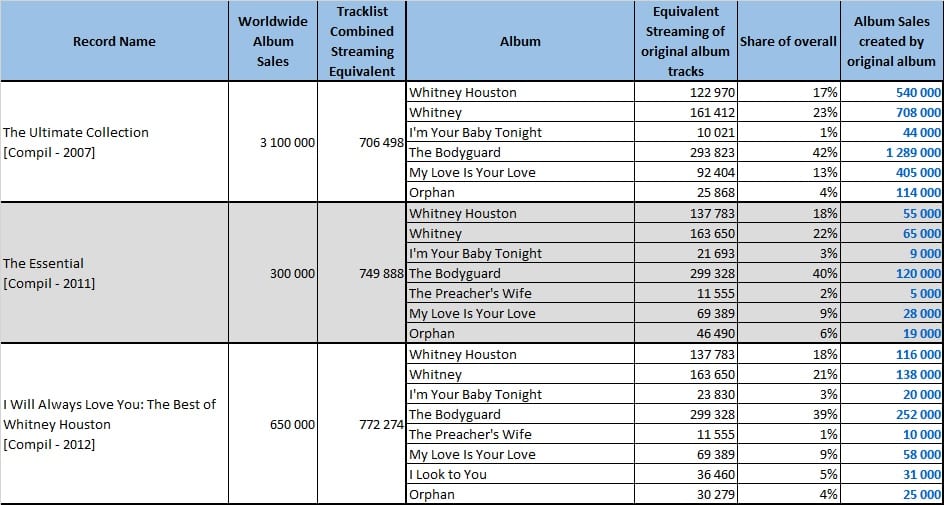
Remaining Long Format Part 3 – Other LPs
All remaining LPs are listed here with one 1986 Japanese remix set, a couple of live albums plus one 5-CDs box. The box is as usual assigned in full to each album present on it while the other albums follow patterns already mentioned prior.
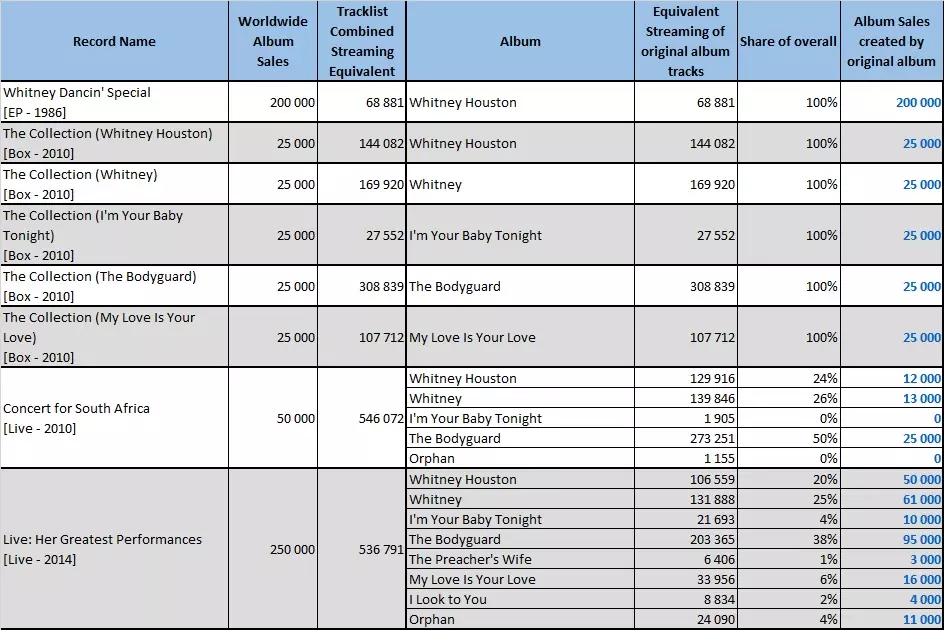
Remaining Long Format Part 4 – Music videos #1
Unless they are themed around something special like The Star Spangled Banner, Whitney Houston’s music videos sales have always been heavily driven by her earliest albums plus The Bodyguard.
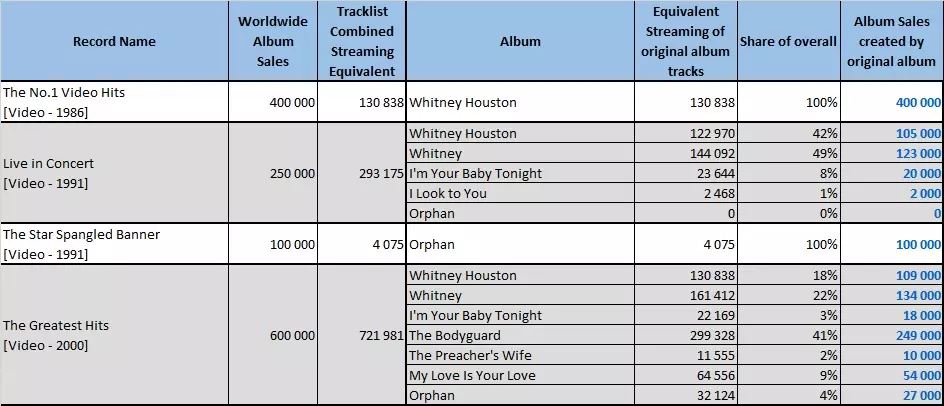
Remaining Long Format Part 5 – Music videos #2
Different videos, same results.
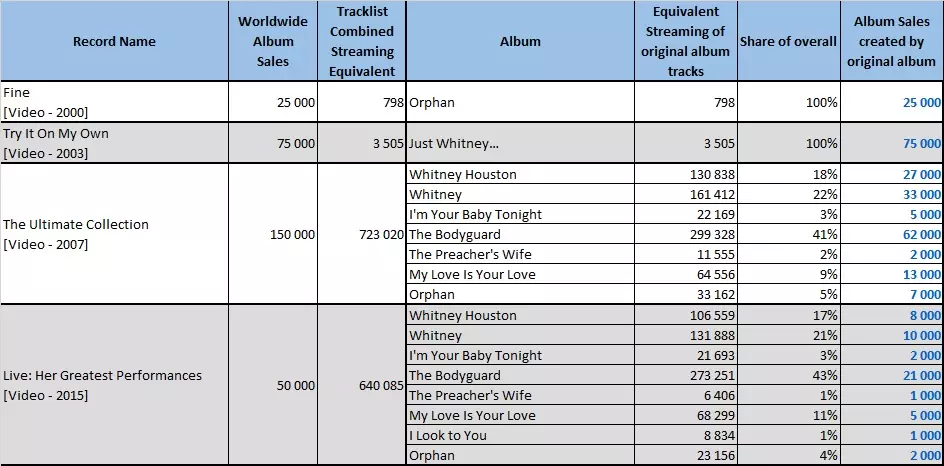
Full Length related records Sales – Summary
Here is the most underestimated indicator of an album’s success – the amount of compilation sales of all kinds it generated. Due to the dependency of the original studio album sales on those releases, they are a key piece of the jigsaw.
The massive strength of The Bodyguard is confirmed as on top of its incredible sales on all formats – pure album sales, physical singles, download singles, streaming – it also generated sales of 6,7 million compilation albums and videos. Whitney’s first two albums are rather strong as well.
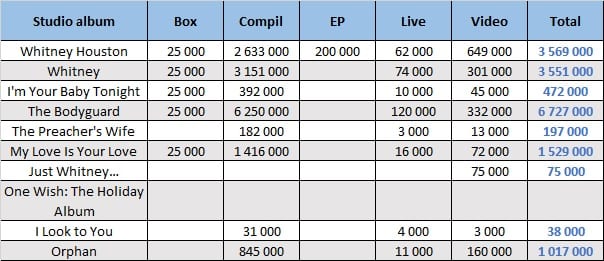
BONUS: Total album (all types) sales per country
- America
- US – 60,260,000
- Canada – 5,790,000
- Argentina – N/A (330,000+)
- Brazil – N/A (1,425,000+)
- Mexico – N/A (655,000+)
- Asia – 14,350,000
- Japan – 7,130,000
- Oceania
- Australia – 1,885,000
- New Zealand – 335,000
- Europe – 40,340,000
- UK – 12,120,000
- France – 4,510,000
- Germany – 6,270,000
- Italy – 3,410,000
- Spain – 1,895,000
- Sweden – 1,525,000
- Netherlands – 1,575,000
- Switzerland – 1,075,000
- Austria – 715,000
- Finland – 267,000
- World – 128,600,000
Please note that some countries totals may be slightly incomplete when the figure is N/A for minor releases. Countries with too much missing information to be precise enough are listed as N/A.
Whitney Houston Career CSPC Results
So, after checking all the figures, how much album sales equivalent has each overall Whitney Houston album achieved? Well, at this point we hardly need to add up all the figures defined in this article!
In the following results table, all categories display figures in equivalent album sales. If different, pure sales are listed between parentheses.
As a reminder:
- Studio Album: sales of the original album
- Other Releases: sales of compilations generated thanks to the album
- Physical Singles: sales of physical singles from the album (ratio 3/10)
- Download Singles: sales of digital singles from the album (ratio 1,5/10)
- Streaming: equivalent album sales of all the album tracks (ratio 1/1500 for Audio stream and 1/6750 for Video stream)
Artist career totals
See where the artist ranks among remaining singers
I’m sure all eyes directly went to The Bodyguard Total CSPC cell. We write and read these kind of articles with excitement precisely to discover those results. You must consider the total to be 53,350,000 overall, once factoring in other sales from singles which aren’t performed by Whitney Houston. Below is the Top 5 albums out of all previously posted articles:
1 1977 Soundtrack / Bee Gees – Saturday Night Fever – 66,705,000
2 1977 Fleetwood Mac – Rumours – 60,508,000
3 1971 Led Zeppelin – Led Zeppelin IV – 56,573,000
4 1978 Soundtrack – Grease – 51,899,000
5 1991 Nirvana – Nevermind – 51,570,000
Thus, The Bodyguard shoots directly to the #4 position on this ranking. This may be slightly disappointing considering it leads physical studio album sales, but it generated nowhere near as many compilation sales as Saturday Night Fever, Rumours or Led Zeppelin IV. Still, 53,35 million equivalent albums sold by a single LP is absolutely extraordinary – to put things into perspective, that’s the same tally as Shakira’s complete discography.
Such a beast surely takes some light away from Whitney’s remaining albums, but they are incredible on their own nonetheless. At 28,4 million and 26,3 million respectively, her first two records are true sales monsters as well. My Love Is Your Love is also rather impressive with 14,6 million overall sales. Subsequent records came nowhere near to such totals, but that doesn’t diminish the feats she managed previously.
In total, Whitney Houston sold a huge 151,7 million equivalent albums. Of course, this is less than Madonna at 241,1 million, Celine Dion at 193,4 million and Mariah Carey at 167,15 million, but one needs to consider Whitney Houston issued much fewer albums than they did. In terms of discography size, it would be more fair to compare her with Britney Spears at 99,8 million or Rihanna at 75,8 million, which shows her outstanding success level.The following section lists her most successful songs.
As usual, feel free to comment and / or ask a question!Sources: IFPI, Spotify, Chartmasters.org.
Biggest tracks – Whitney Houston
The list of most successful songs is compiled in album equivalent sales generated by each of them. It includes the song’s own physical singles sales with a 0,3 weighting, its download and streaming sales with appropriate weighting too plus its share among sales of all albums on which it is featured.
1 1992 – I Will Always Love You [The Bodyguard] – 33,620,000
2 1987 – I Wanna Dance with Somebody (Who Loves Me) [Whitney] – 19,630,000
3 1992 – I Have Nothing [The Bodyguard] – 11,570,000
4 1985 – How Will I Know [Whitney Houston] – 11,350,000
5 1985 – Greatest Love of All [Whitney Houston] – 7,730,000
6 1985 – Saving All My Love for You [Whitney Houston] – 5,320,000
7 1998 – My Love Is Your Love [My Love Is Your Love] – 4,940,000
8 1990 – All the Man That I Need [I’m Your Baby Tonight] – 4,930,000
9 1990 – I’m Your Baby Tonight [I’m Your Baby Tonight] – 4,420,000
10 1998 – When You Believe [My Love Is Your Love] – 4,010,000
11 1992 – Run to You [The Bodyguard] – 3,490,000
12 1992 – I’m Every Woman [The Bodyguard] – 2,840,000
13 1998 – It’s Not Right, But It’s Okay [My Love Is Your Love] – 2,810,000
14 1987 – Didn’t We Almost Have It All [Whitney] – 2,220,000
15 1996 – I Believe in You and Me [The Preacher’s Wife] – 2,170,000
16 1996 – Step by Step [The Preacher’s Wife] – 1,860,000
17 1987 – Where Do Broken Hearts Go [Whitney] – 1,830,000
18 1985 – You Give Good Love [Whitney Houston] – 1,770,000
19 1987 – So Emotional [Whitney] – 1,500,000
20 1998 – Heartbreak Hotel [My Love Is Your Love] – 1,340,000
If you feel inspired by this list, we just created this CSPC Whitney Houston playlist on Spotify!
We have more for you…
… checking out the upcoming artists or even voting for them!
